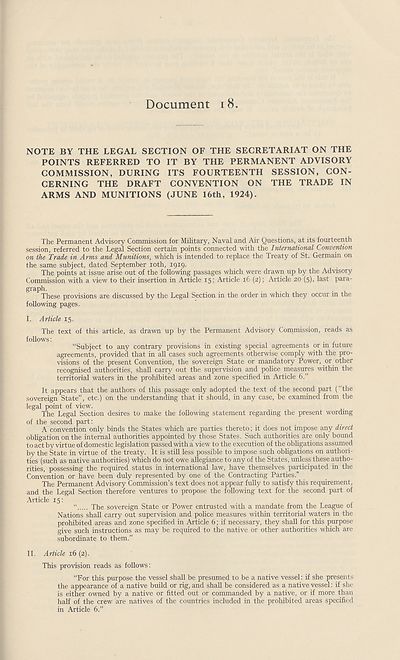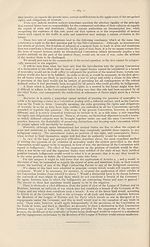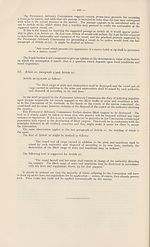Armament > Conference for the control of the international trade in arms, munitions and implements of war
(167)
Download files
Complete book:
Individual page:
Thumbnail gallery: Grid view | List view

Document 18.
NOTE BY THE LEGAL SECTION OF THE SECRETARIAT ON THE
POINTS REFERRED TO IT BY THE PERMANENT ADVISORY
COMMISSION, DURING ITS FOURTEENTH SESSION, CON¬
CERNING THE DRAFT CONVENTION ON THE TRADE IN
ARMS AND MUNITIONS (JUNE 16th, 1924).
The Permanent Advisory Commission for Military, Naval and Air Questions, at its fourteenth
session, referred to the Legal Section certain points connected with the International Convention
on the Trade in Arms and Munitions, which is intended to replace the Treaty of St. Germain on
the same subject, dated September 10th, 1919.
The points at issue arise out of the following passages which were drawn up by the Advisory
Commission with a view to their insertion in Article 15; Article 16 (2); Article 20 (5), last para-
graph. ... . . . u
These provisions are discussed by the Legal Section in the order in which they occur m the
following pages.
I. Article 15.
The text of this article, as drawn up by the Permanent Advisory Commission, reads as
follows:
“Subject to any contrary provisions in existing special agreements or in future
agreements, provided that in all cases such agreements otherwise comply with the pro¬
visions of the present Convention, the sovereign State or mandatory Power, or other
recognised authorities, shall carry out the supervision and police measures within the
territorial waters in the prohibited areas and zone specified in Article 6/’
It appears that the authors of this passage only adopted the text of the second part (“the
sovereign State”, etc.) on the understanding that it should, in any case, be examined from the
legal point of view.
The Legal Section desires to make the following statement regarding the present wording
of the second part:
A convention only binds the States which are parties thereto; it does not impose any direct
obligation on the internal authorities appointed by those States. Such authorities are only bound
to act by virtue of domestic legislation passed with a view to the execution of the obligations assumed
by the State in virtue of the treaty. It is still less possible to impose such obligations on authori¬
ties (such as native authorities) which do not owe allegiance to any of the States, unless these autho¬
rities, possessing the required status in international law, have themselves participated in the
Convention or have been duly represented by one of the Contracting Parties.*
The Permanent Advisory Commission’s text does not appear fully to satisfy this requirement,
and the Legal Section therefore ventures to propose the following text for the second part of
Article 15:
" The sovereign State or Power entrusted with a mandate from the League of
Nations shall carry out supervision and police measures within territorial waters in the
prohibited areas and zone specified in Article 6; if necessary, they shall for this purpose
give such instructions as may be required to the native or other authorities which are
subordinate to them.”
II. Article 16 (2).
This provision reads as follows:
“For this purpose the vessel shall be presumed to be a native vessel: if she presents
the appearance of a native build or rig, and shall be considered as a native vessel: if she
is either owned by a native or fitted out or commanded by a native, or if more than
half of the crew are natives of the countries included in the prohibited areas specified
in Article 6.”
NOTE BY THE LEGAL SECTION OF THE SECRETARIAT ON THE
POINTS REFERRED TO IT BY THE PERMANENT ADVISORY
COMMISSION, DURING ITS FOURTEENTH SESSION, CON¬
CERNING THE DRAFT CONVENTION ON THE TRADE IN
ARMS AND MUNITIONS (JUNE 16th, 1924).
The Permanent Advisory Commission for Military, Naval and Air Questions, at its fourteenth
session, referred to the Legal Section certain points connected with the International Convention
on the Trade in Arms and Munitions, which is intended to replace the Treaty of St. Germain on
the same subject, dated September 10th, 1919.
The points at issue arise out of the following passages which were drawn up by the Advisory
Commission with a view to their insertion in Article 15; Article 16 (2); Article 20 (5), last para-
graph. ... . . . u
These provisions are discussed by the Legal Section in the order in which they occur m the
following pages.
I. Article 15.
The text of this article, as drawn up by the Permanent Advisory Commission, reads as
follows:
“Subject to any contrary provisions in existing special agreements or in future
agreements, provided that in all cases such agreements otherwise comply with the pro¬
visions of the present Convention, the sovereign State or mandatory Power, or other
recognised authorities, shall carry out the supervision and police measures within the
territorial waters in the prohibited areas and zone specified in Article 6/’
It appears that the authors of this passage only adopted the text of the second part (“the
sovereign State”, etc.) on the understanding that it should, in any case, be examined from the
legal point of view.
The Legal Section desires to make the following statement regarding the present wording
of the second part:
A convention only binds the States which are parties thereto; it does not impose any direct
obligation on the internal authorities appointed by those States. Such authorities are only bound
to act by virtue of domestic legislation passed with a view to the execution of the obligations assumed
by the State in virtue of the treaty. It is still less possible to impose such obligations on authori¬
ties (such as native authorities) which do not owe allegiance to any of the States, unless these autho¬
rities, possessing the required status in international law, have themselves participated in the
Convention or have been duly represented by one of the Contracting Parties.*
The Permanent Advisory Commission’s text does not appear fully to satisfy this requirement,
and the Legal Section therefore ventures to propose the following text for the second part of
Article 15:
" The sovereign State or Power entrusted with a mandate from the League of
Nations shall carry out supervision and police measures within territorial waters in the
prohibited areas and zone specified in Article 6; if necessary, they shall for this purpose
give such instructions as may be required to the native or other authorities which are
subordinate to them.”
II. Article 16 (2).
This provision reads as follows:
“For this purpose the vessel shall be presumed to be a native vessel: if she presents
the appearance of a native build or rig, and shall be considered as a native vessel: if she
is either owned by a native or fitted out or commanded by a native, or if more than
half of the crew are natives of the countries included in the prohibited areas specified
in Article 6.”
Set display mode to:
![]() Universal Viewer |
Universal Viewer | ![]() Mirador |
Large image | Transcription
Mirador |
Large image | Transcription
Images and transcriptions on this page, including medium image downloads, may be used under the Creative Commons Attribution 4.0 International Licence unless otherwise stated. ![]()
| League of Nations > Armament > Conference for the control of the international trade in arms, munitions and implements of war > (167) |
|---|
| Permanent URL | https://digital.nls.uk/195383934 |
|---|
| Shelfmark | LN.IX |
|---|
| Description | Over 1,200 documents from the non-political organs of the League of Nations that dealt with health, disarmament, economic and financial matters for the duration of the League (1919-1945). Also online are statistical bulletins, essential facts, and an overview of the League by the first Secretary General, Sir Eric Drummond. These items are part of the Official Publications collection at the National Library of Scotland. |
|---|---|
| Additional NLS resources: |
|

